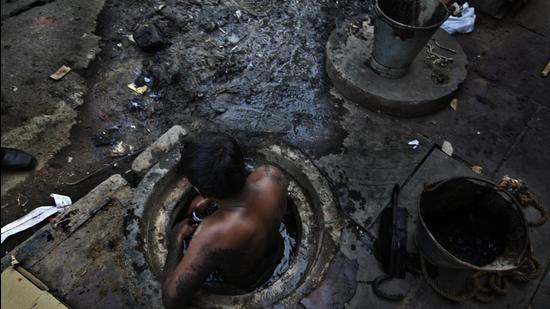2 die while cleaning drain in Telangana
B Yellaih, who is a contractor employed by GHMC, had hired the two men for the corporation’s desilting work. He allegedly made them enter the manhole around 10:30pm without any protective gear.
Two workers died of asphyxiation while cleaning a drain in Telangana on Tuesday barely days after the Centre told Parliament that there have been no deaths due to manual scavenging in the country in the last five years.

The incident occurred late at night at Padmavathi Colony in Sahebnagar of LB Nagar division, which falls under the Greater Hyderabad Municipal Corporation (GHMC) limits.
Police identified the victims as Shiva (25) and Ananthaiah (45) and said both belonged to the Scheduled Castes. But Ananthaiah’s body had still not been retrieved even 40 hours after he had slipped into a manhole and despite rescue efforts by police, fire brigade and Disaster Response Force teams. Two earthmovers were digging up a narrow pipeline at the time of filing of this report.
B Yellaih, who is a contractor employed by GHMC, had hired the two men for the corporation’s desilting work. He allegedly made them enter the manhole around 10:30pm without any protective gear.
Later, GHMC issued a release in which it said that the contractor was not working according to the prescribed rules of sanitation, which do not allow any cleaning work to be carried out after 6pm. The corporation added that the contractor also did not notify them about the desilting work.
Vanasthalipuram assistant commissioner of police K Purushotham Reddy said Yellaiah has been booked under the Prohibition of Employment as Manual Scavengers and their Rehabilitation Act, 2013, and Section 304A (causing death by negligence) of the Indian Penal Code based on the complaint by the relatives of the deceased. “The accused is yet to be arrested. Further investigation is underway,” he added.
In 2017, the Telangana government had introduced around 70 units of ‘mini sewer-jetting machines’ in a bid to end manual scavenging in Hyderabad. These compact machines could be taken even to narrow lanes without difficulty.
“We have four machines in the zone. But we do not know why the contractor asked the men to get into the manhole. We will know the details only after questioning him,” said A Maruthi Diwakar, GHMC deputy commissioner of LB Nagar zone.
But the corporation staff didn’t quite buy the argument of the authorities. K Saraswathi, the president of the Safai Karamchari Andolan in Telangana, said the GHMC cannot shrug off responsibility by solely blaming the contractor. “A case should also be filed against commissioner D Lokesh Kumar. The families of the deceased have to be compensated,” she said.
Saraswathi elaborated on the compensation argument and said Shiva’s widow is eight months’ pregnant and Ananthaiah is survived by his 40-year-old widow and both women need support.
The 2013 law against manual scavenging says: “No person, local authority or any agency shall engage or employ, either directly or indirectly, any person for hazardous cleaning of a sewer or a septic tank.”
The Act says the first violation will attract imprisonment of up to a year or a fine of ₹50,000, or both. Subsequent violations will attract imprisonment for up to two years or a fine of up to ₹1 lakh, or both.
On Wednesday, the Union government told Parliament that 941 people died while cleaning sewers and septic tanks in the last two decades. It also reiterated the July 28 statement of Union social justice minister Ramdas Athawale in Parliament that there were no deaths due to manual scavenging in the last five years.
The government distinguishes manual scavenging — the caste-based practice of people cleaning human excreta by hand — from the cleaning of sewers even though experts say that the latter is just an extension of the now-banned practice.






